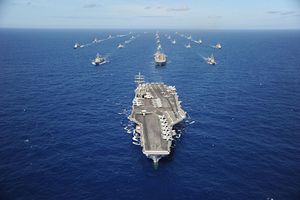An editorial in the Global Times “endorses” China’s participation in RIMAC in a way that only Chinese state media — and the Global Times in particular — could.
The piece of course begins by pointing out that the “U.S.-led RIMPAC is a remnant of the Cold War. It was originally directed against the Soviet Union, but nowadays the target is deliberately made vague [my emphasis].” As Ankit pointed out over at Flashpoints, China’s media has typically characterized RIMPAC as an effort at containing China. It’s interesting to note that China’s participation in RIMPAC hasn’t changed this position — but Chinese media now expresses this view slightly less explicitly.
After noting that the Sino-U.S. relationship has generally improved recently — or, as the article puts it, they have built a “new type of great power relations” as Xi Jinping claimed they would — GT points out that “radical figures from both countries think the joint military exercise is nothing but a ‘vanity project’ which does not help improve bilateral ties.” Where does GT come down on this issue? It believes strongly that “Such views are not necessarily true [my emphasis].” Why aren’t they necessarily true? Why because “Even superficial friendly moves are important” of course!
That being said, GT notes that there are “key discrepancies” between the two sides that do need to be “clarified.” What are these? Well, for one, the U.S. believes that “China’s sovereignty protection acts in the East China Sea and the South China Sea” are emblematic of its larger ambitions to push the U.S. out of the region. GT does the public service of clarifying this key discrepancy between the two sides by explaining that “U.S. views are dominated by a hegemonic mentality.” It’s unclear whether all U.S. views suffer from this ailment or just U.S. views on “China’s sovereignty protection acts.” Whatever the case, it’s worth pointing out that when it comes to China’s sovereignty protection acts in the China Seas, the entire region besides China seems to have come down with the same hegemonic mentality.
Are there any other key discrepancies that need to be resolved? In fact there are. GT notes that China believes the U.S. is trying to contain its rise. America, the editorial notes, has denied this while claiming “that this just reflects the diversity of American society.” From what I can gather, GT is saying that the U.S. government denies wanting to contain China but admits to understanding why Beijing has this impression because many in the U.S. in fact do want to pursue containment. This is unavoidable, however, given the diversity of American society. Regardless, GT decides against public service in this instance by not explicitly clarifying this key discrepancy. If I had to guess, I’d say GT is unconvinced by America’s denial.
The above characterization of the editorial is admittedly selective, although I feel it captures the general tone and true feelings of the authors. Still, it is imperative to note that other parts of the editorial are less cynical. For example, at one point the GT editorial board writes, “The interests of the two countries are intertwined. Maintaining the positive aspects of bilateral relations suits the individual interests of the two sides more than destroying them.” So, the positive aspects of Sino-U.S. relations are worth enough to not warrant destruction. That’s something right?
The piece also argues that “the militaries of both sides should avoid acting tough toward each other and instead carry out more joint exercises,” and that “the scale of cooperation between the two [nations], as well as the vigilance they maintain toward each other, are both unprecedented” (notably, this latter line is the daily quote on the side of GT’s English-language website).
GT goes on to admit that “for a long time in the future, China will still be weaker than the U.S.” It also says that to best deal with this reality, Chinese “should insist on our own interests and become strategically tolerant about frictions between the two.” Strategic tolerance about disagreements is surely better than zero tolerance about disagreements.
Still, the general tone of the editorial is fairly cynical and leaves the reader with the unavoidable impression that the GT editorial board felt compelled to at least ostensibly endorse the drill given PLAN’s participation, regardless of how it actually feels about it. This view and the general cynicism are perhaps best captured when the editorial states: “Many remain pessimistic about whether the two [nations] can build mutual strategic trust. But as long as no war is initiated, the Asia-Pacific region and even the entire world will feel relaxed [my emphasis].” Hey, no one ever accused GT of setting the bar too high.

































